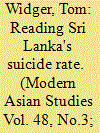|
|
|
Sort Order |
|
|
|
Items / Page
|
|
|
|
|
|
|
| Srl | Item |
| 1 |
ID:
131808


|
|
|
|
|
| Publication |
2014.
|
| Summary/Abstract |
By the final decade of the twentieth century, rates of suicide in Sri Lanka ranked among the highest in the world. However, in 1996 the suicide rate began to fall and was soon at its lowest level in almost 30 years. This decline poses problems for classic sociological theories of suicide and forces us to question some fundamental assumptions underlying social scientific approaches to the suicide rate. Drawing from sociological, medical epidemiological, historical, and anthropological secondary sources as well as 21 months of original ethnographic research into suicide in Sri Lanka, I argue that there are four possible readings of the country's suicide rate. While the first three readings provide windows onto parts of the story, the fourth-a composite view-provides a new way of thinking about suicide, not just in Sri Lanka but also cross-culturally. In so doing the paper poses questions for how the relationship between suicide and society might be imagined.
|
|
|
|
|
|
|
|
|
|
|
|
|
|
|
|
| 2 |
ID:
151242


|
|
|
|
|
| Summary/Abstract |
Philanthronationalism – the pursuance of corporate ‘good governance’ and equality initiatives for ethno-religious political ends – shapes at a fundamental level business practice in Sri Lanka. In this article, Sri Lankan firms’ approaches to the management of ‘diversity and inclusion’ in human resourcing, brand development, and market expansion and outsourcing are explored. While many in the private sector appear to wish to promote the creation of a more harmonious and peaceful society through ethical governance processes, a continued concern to play to the Sinhala Buddhist nationalist constituency often makes this difficult.
|
|
|
|
|
|
|
|
|
|
|
|
|
|
|
|
| 3 |
ID:
158571


|
|
|
|
|
| Summary/Abstract |
Recent research on contemporary modalities of Islamic or Muslim philanthropy has focused on processes of subjectification through which givers and recipients of charity are habituated or craft themselves to an ethic of piety, social responsibility, and (neoliberal) economic virtuosity. These studies, however, have concentrated almost exclusively on those who give charity, leading to an over-emphasis on the perspectives of givers, and on their role in determining how the poor might deal with their everyday lives and imagined futures. As a result, small-scale gifting relations in which the Muslim poor may also be involved—making the poor simultaneously givers and recipients of charity—have been obscured or erased altogether. In this article, we argue that the concerns of the poor might not always or necessarily be those of the wealthy donors of charity. By receiving and giving sadaqa and zakat, poor and working-class Muslims in a Colombo neighbourhood imagine inclusion and belonging to the wider Muslim community in Colombo, which is not contingent upon the mediation and pedagogical interventions of charitable organizations and (middle-class) pious donors. Importantly, this imagination of inclusion and belonging comes at a time when the Muslim poor are increasingly marginalized by virtue of a (middle-class) discourse that, by framing charity as a means ‘to help the poor to help themselves’, has turned socio-economic upliftment into an ethical duty and, consequently, failure to improve oneself has become the symptom of wider moral shortcomings.
|
|
|
|
|
|
|
|
|
|
|
|
|
|
|
|
|
|
|
|
|